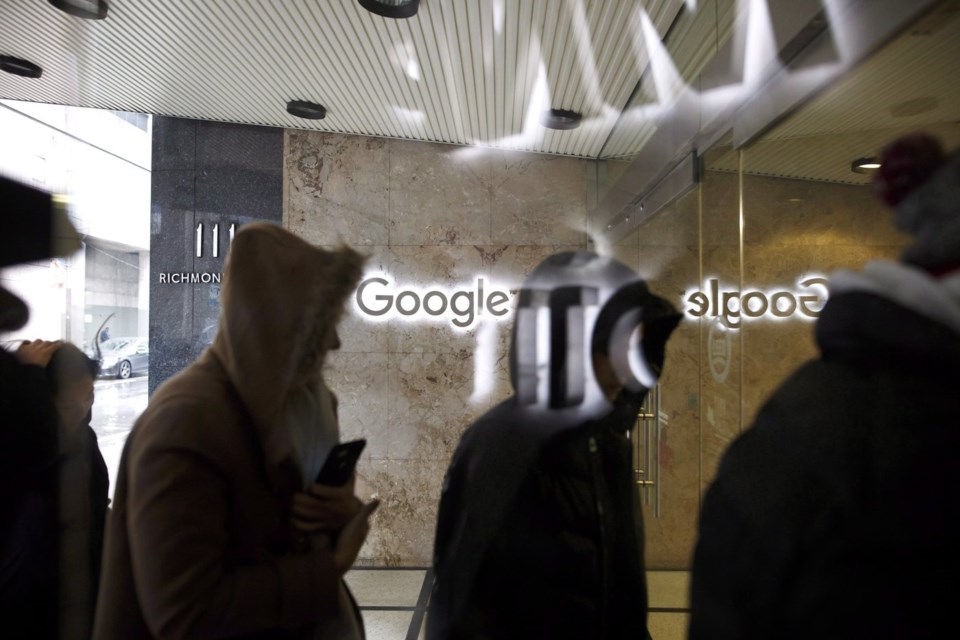OTTAWA — Google denies abusing its market power in a written response to the Competition Bureau's lawsuit over the tech giant's advertising practices in Canada.
In court documents filed Friday, Google and its Canadian arm argued that the company does not have a "substantial degree of market power."
The Competition Bureau is suing Google over alleged anticompetitive conduct in its online advertising business. It wants Google to sell two of its services and pay a penalty.
The company disputes the bureau's definition of the market, arguing that by focusing on web advertising it zeroed in on a narrow subset of digital advertising.
The markets "in which Google is alleged to have abused its dominant position are untethered either to commercial reality or to proper and sensible economic and legal analyses," Google argued in the court filing.
Google also says the financial penalty being sought by the bureau is unconstitutional.
In launching the suit against Google, the bureau said its investigation found the company "unlawfully" tied together its ad tech tools to maintain market dominance.
The ads that appear on websites are usually bought and sold through automated auctions. Companies use a number of tools to manage ad inventory, facilitate purchases or act as an intermediary between buyers and sellers.
Google owns four of the largest online ad technology services used in Canada: DoubleClick for Publishers, AdX, Display & Video 360 and Google Ads. The bureau has estimated Google holds about 90 per cent market share in publisher ad servers, 70 per cent in advertiser networks, 60 per cent in demand-side platforms and 50 per cent in ad exchanges.
The bureau alleges that Google has abused its dominant position in the web advertising market, discouraging competition, inhibiting innovation, inflating advertising costs and reducing publisher revenues. It wants Google to sell DoubleClick for Publishers and AdX.
In its response, Google denies engaging in illegal or inappropriate conduct, and objects to the divestiture order.
Google says the bureau's claim that it unlawfully tied together its ad tech tools is false.
It says that by focusing on web advertising the bureau is ignoring advertising on other platforms such as in mobile applications and through connected television platforms. It also accuses the bureau of splicing that narrowly defined market into "artificial silos" in order to make its arguments.
The company accuses the Competition Bureau and its commissioner of violating its constitutional rights.
The bureau has demanded that Google pay a penalty equal to three times the value of the benefit it derived from anticompetitive practices or, "if that amount cannot be reasonably determined," three per cent of Google’s worldwide gross revenues.
Google says a penalty of that size is "constitutionally impermissible" and "contrary to the public interest."
"The very threat of such a fine will diminish or negate the incentives of Google, Google Canada and many other businesses to invest and innovate, thus undermining consumer welfare," it said.
The Competition Bureau did not immediately respond to a request for comment.
Its investigation dates back to at least 2021.
The matter is being dealt with at the Competition Tribunal, a quasi-judicial body that hears cases brought forward by the competition commissioner about non-compliance with the Competition Act.
Google says that contrary to claims made by the bureau, the ad tech industry is competitive and innovative, and that Google "faces stiff competition" including from other giants like Microsoft, Meta and Amazon.
"Google’s share of the relevant market has declined over time while industry output has increased dramatically, quality of service has improved and prices associated with the ad tech services in question have remained stable or declined," the company said.
Google says that if the bureau is successful in its suit, it would "undermine rather than promote innovation and competition in Canada."
— With files from Tara Deschamps
This report by The Canadian Press was first published Feb. 17, 2025.
Rosa Saba, The Canadian Press



